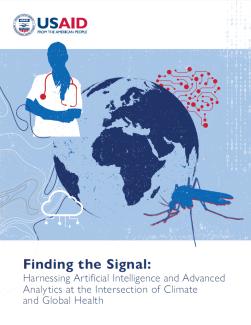Context for this effort. Climate factors present substantial risks to human health,5 yet the global community has limited capabilities to describe these relationships, to predict what scenarios will happen with accuracy, and to recommend what decisions to take. Artificial intelligence and advanced analytics (AI/AA) methods offer the potential to augment current capabilities, but understanding and implementing at the intersection of AI/AA, climate, and health remains nascent today, particularly in low- and middle-income countries (LMICs). This report shares AI/AA use cases for climate and health that are already adding value in real-world settings while recommending pathways to deploy more so that decision-makers can realize the full potential of these novel methods.
Scope of this effort. This effort aims to align with relatively consistent overall definitions and categorizations of artificial intelligence—recognizing the variance that exists—and intends to focus on the subset of AI approaches that tend to be most relevant to climate and global health topics. AI is defined as the use of computers for automated decision-making to perform tasks that normally require human intelligence, including a focused subset of supervised and unsupervised machine learning methods (e.g., data mining, predictive modeling, deep learning). This definition builds on and is consistent with the recent United States Agency for International Development (USAID) guidance, AI Action Plan, and study, AI in Global Health. In addition, this effort includes optimization and geo-analytics as advanced analytics (AA) approaches are in scope, building on and consistent with the recent USAID study, Data and Advanced Analytics in HIV Service Delivery: Use Cases to Help Reach 95-95-95.

